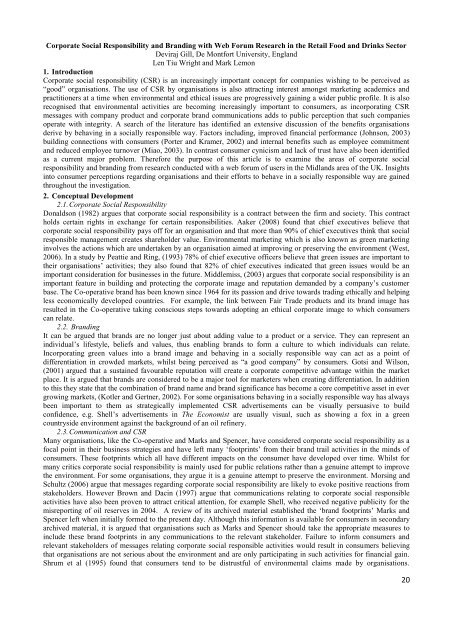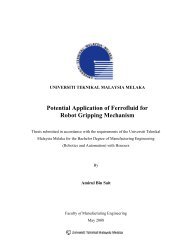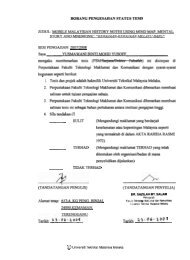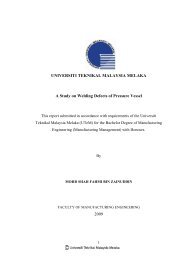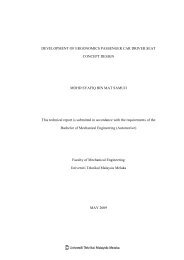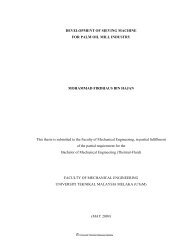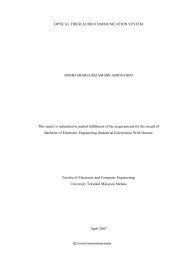Brand, Identity and Reputation: Exploring, Creating New Realities ...
Brand, Identity and Reputation: Exploring, Creating New Realities ...
Brand, Identity and Reputation: Exploring, Creating New Realities ...
Create successful ePaper yourself
Turn your PDF publications into a flip-book with our unique Google optimized e-Paper software.
Corporate Social Responsibility <strong>and</strong> <strong>Br<strong>and</strong></strong>ing with Web Forum Research in the Retail Food <strong>and</strong> Drinks Sector<br />
Deviraj Gill, De Montfort University, Engl<strong>and</strong><br />
Len Tiu Wright <strong>and</strong> Mark Lemon<br />
1. Introduction<br />
Corporate social responsibility (CSR) is an increasingly important concept for companies wishing to be perceived as<br />
―good‖ organisations. The use of CSR by organisations is also attracting interest amongst marketing academics <strong>and</strong><br />
practitioners at a time when environmental <strong>and</strong> ethical issues are progressively gaining a wider public profile. It is also<br />
recognised that environmental activities are becoming increasingly important to consumers, as incorporating CSR<br />
messages with company product <strong>and</strong> corporate br<strong>and</strong> communications adds to public perception that such companies<br />
operate with integrity. A search of the literature has identified an extensive discussion of the benefits organisations<br />
derive by behaving in a socially responsible way. Factors including, improved financial performance (Johnson, 2003)<br />
building connections with consumers (Porter <strong>and</strong> Kramer, 2002) <strong>and</strong> internal benefits such as employee commitment<br />
<strong>and</strong> reduced employee turnover (Miao, 2003). In contrast consumer cynicism <strong>and</strong> lack of trust have also been identified<br />
as a current major problem. Therefore the purpose of this article is to examine the areas of corporate social<br />
responsibility <strong>and</strong> br<strong>and</strong>ing from research conducted with a web forum of users in the Midl<strong>and</strong>s area of the UK. Insights<br />
into consumer perceptions regarding organisations <strong>and</strong> their efforts to behave in a socially responsible way are gained<br />
throughout the investigation.<br />
2. Conceptual Development<br />
2.1. Corporate Social Responsibility<br />
Donaldson (1982) argues that corporate social responsibility is a contract between the firm <strong>and</strong> society. This contract<br />
holds certain rights in exchange for certain responsibilities. Aaker (2008) found that chief executives believe that<br />
corporate social responsibility pays off for an organisation <strong>and</strong> that more than 90% of chief executives think that social<br />
responsible management creates shareholder value. Environmental marketing which is also known as green marketing<br />
involves the actions which are undertaken by an organisation aimed at improving or preserving the environment (West,<br />
2006). In a study by Peattie <strong>and</strong> Ring, (1993) 78% of chief executive officers believe that green issues are important to<br />
their organisations‘ activities; they also found that 82% of chief executives indicated that green issues would be an<br />
important consideration for businesses in the future. Middlemiss, (2003) argues that corporate social responsibility is an<br />
important feature in building <strong>and</strong> protecting the corporate image <strong>and</strong> reputation dem<strong>and</strong>ed by a company‘s customer<br />
base. The Co-operative br<strong>and</strong> has been known since 1964 for its passion <strong>and</strong> drive towards trading ethically <strong>and</strong> helping<br />
less economically developed countries. For example, the link between Fair Trade products <strong>and</strong> its br<strong>and</strong> image has<br />
resulted in the Co-operative taking conscious steps towards adopting an ethical corporate image to which consumers<br />
can relate.<br />
2.2. <strong>Br<strong>and</strong></strong>ing<br />
It can be argued that br<strong>and</strong>s are no longer just about adding value to a product or a service. They can represent an<br />
individual‘s lifestyle, beliefs <strong>and</strong> values, thus enabling br<strong>and</strong>s to form a culture to which individuals can relate.<br />
Incorporating green values into a br<strong>and</strong> image <strong>and</strong> behaving in a socially responsible way can act as a point of<br />
differentiation in crowded markets, whilst being perceived as ―a good company‖ by consumers. Gotsi <strong>and</strong> Wilson,<br />
(2001) argued that a sustained favourable reputation will create a corporate competitive advantage within the market<br />
place. It is argued that br<strong>and</strong>s are considered to be a major tool for marketers when creating differentiation. In addition<br />
to this they state that the combination of br<strong>and</strong> name <strong>and</strong> br<strong>and</strong> significance has become a core competitive asset in ever<br />
growing markets, (Kotler <strong>and</strong> Gertner, 2002). For some organisations behaving in a socially responsible way has always<br />
been important to them as strategically implemented CSR advertisements can be visually persuasive to build<br />
confidence, e.g. Shell‘s advertisements in The Economist are usually visual, such as showing a fox in a green<br />
countryside environment against the background of an oil refinery.<br />
2.3. Communication <strong>and</strong> CSR<br />
Many organisations, like the Co-operative <strong>and</strong> Marks <strong>and</strong> Spencer, have considered corporate social responsibility as a<br />
focal point in their business strategies <strong>and</strong> have left many ‗footprints‘ from their br<strong>and</strong> trail activities in the minds of<br />
consumers. These footprints which all have different impacts on the consumer have developed over time. Whilst for<br />
many critics corporate social responsibility is mainly used for public relations rather than a genuine attempt to improve<br />
the environment. For some organisations, they argue it is a genuine attempt to preserve the environment. Morsing <strong>and</strong><br />
Schultz (2006) argue that messages regarding corporate social responsibility are likely to evoke positive reactions from<br />
stakeholders. However Brown <strong>and</strong> Dacin (1997) argue that communications relating to corporate social responsible<br />
activities have also been proven to attract critical attention, for example Shell, who received negative publicity for the<br />
misreporting of oil reserves in 2004. A review of its archived material established the ‗br<strong>and</strong> footprints‘ Marks <strong>and</strong><br />
Spencer left when initially formed to the present day. Although this information is available for consumers in secondary<br />
archived material, it is argued that organisations such as Marks <strong>and</strong> Spencer should take the appropriate measures to<br />
include these br<strong>and</strong> footprints in any communications to the relevant stakeholder. Failure to inform consumers <strong>and</strong><br />
relevant stakeholders of messages relating corporate social responsible activities would result in consumers believing<br />
that organisations are not serious about the environment <strong>and</strong> are only participating in such activities for financial gain.<br />
Shrum et al (1995) found that consumers tend to be distrustful of environmental claims made by organisations.<br />
20


